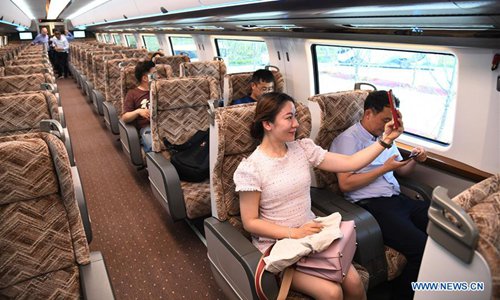
Guests visit inside of China's first high-speed maglev train testing prototype in Qingdao, east China's Shandong Province,on May 23, 2019. (Xinhua/Li Ziheng)
Chinese telecom solutions provider ZTE jointly with China Telecom successfully conducted the first 5G commercial use test on a maglev train - the first such test in the world proving that a 5G network can provide an ideal broadband communication service for ultra-high-speed trains, according to the company's website.
The test was conducted on Shanghai maglev railway - the fastest commercial maglev railway in the world, and "that means this solution could be applied to many bullet trains and maglev trains with different standards from different countries, and has huge market potential," the company said.
The tested application scenarios included video conferencing, HD video streaming and interactive gaming. The company's website explains that the "5G connection was stable and efficient to support each scenario during the whole test while the speed of the train was nearly 500 kilometers per hour."
It has been a big challenge for carriers and equipment makers to provide a stable and high-quality network connection for bullet trains due to the nature of high speeds, especially for building a 5G network.
The company said that it has been working with China Telecom to address this issue and made several breakthroughs such as reducing nearly 90 percent of connection switching between base stations while the train maintains a high speed, which could keep the connection more stable and smooth.
According to media reports, China so far has three maglev railways in commercial operation, including Shanghai Maglev Train, which started commercial operation in 2003, Beijing subway line S1(2017), and Changsha Maglev Express (2016).
Among the rapid high-speed railway development, how to provide a stable and fast network connection for customers is very important for train operators to maintain competitiveness, and the tested equipment could provide a complete solution for operators, the company's website said.

